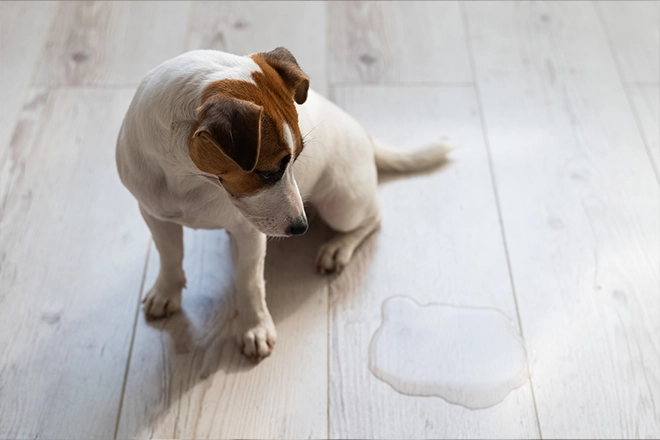For the Purrbabies


Even well-trained dogs can have accidents at work. Here’s what to do when it happens.

Having pets can be unpredictable, especially when they’re in new environments. Even dogs that are pros at accompanying their owners to the office can have accidents sometimes. It’s how the owner handles the mishap that will define the interaction. While stressful (and maybe a little embarrassing), knowing how to handle these accidents at work can make the process as smooth and painless as possible.
If you notice your pet had an accident, immediately clean it up. Why? Well, for a few reasons. Pet-friendly spaces are becoming more popular in hospitality spaces, hotels, residential living, and the workplace but that doesn’t mean companies have to allow it. In fact, beyond welcoming service animals, buildings don’t have to legally let pets in. We want more places to adopt pet-friendly attitudes and stay that way but leaving a puddle of pee or an unwelcome poop pile sitting around the watercooler can be a huge turn off. Plus, you want to make sure you’re respecting your coworkers' time and space and that means making sure they have a clean place to work.
If you’ve determined with your vet that your dog doesn’t have a medical issue causing them to go potty outside of their potty breaks then the next step is to understand why they’re having accidents and moving forward to prevent future ones.
If you find that none of these are working, and your dog’s stress or anxiety is too severe, you may need to find other arrangements for them instead of them joining you in the office.
Preparation is key to ensuring you and your dog have a great time together in the office. That means working with them to ensure they’re on their best behavior and chatting with your coworkers so they’re aware.
Training comes in many forms, but even the basics are enough. That means focusing on some of the key success metrics, like basic commands. Including sit, stay, come, lie down, and leave it/drop it, basic commands lay a strong groundwork for communication. These commands can not only help your dog follow direction, but can keep them safe when out in the world. In the office, these commands make sure your dog doesn’t wander off and if they do, that they come back to you without fuss.
Leash and harness training is another one that can come in handy in the office (and in life). In most public areas it's a mandated law. In the office, having your pet leash and harness trained can create an understanding in your dog that sticking close to you when out and about is the right choice.
👉If you’re going to take your dog into the office, one of the most important parts of training comes in the form of socialization. We cannot stress how important this is in helping your dog be accepting of both humans and other animals.
If you’re looking for professional help there are trainers who can help guide you through the training process. Just be sure that they’re accredited and have good reviews from past clients. There’s also the American Kennel Club Canine Good Citizen certification that teaches good manners to dogs and responsible dog ownership to their human counterparts. In an office, this proactive approach can be beneficial.
No one likes it, but accidents happen even with great training. All you can do is clean up the mess and continue to be consistent with your routine. Plus, a little extra flexibility here and there can’t hurt. That means maybe taking your dog on more potty breaks or not taking them into the office every day. Regardless of how you handle it, accidents aren’t the end of the world for you or your pet, even if it happens within the four walls of your office.
Your coworkers share the same space as you in an office and that means they also may bear the consequences of a dog accident. It’s important to communicate with your coworkers that you're bringing your dog into work and let them know how you’ll handle any pet accidents that might pop up. They may even be pet owners themselves who have advice they could share with you on how to handle accidents.
Sometimes we have to be honest with ourselves and decide if what we want aligns with what is best. Not all dogs are cut out to be in an office setting everyday, especially if part of the office experience is unchangeable and makes your dog uncomfortable. Alternatives can sometimes cost money, but they can also be better options:
It’s great to bring dogs into offices and can brighten anyone's day, but the risk of potty accidents is always there. Be courteous, clean, and most of all, take it easy on yourself if your dog does have an accident at work.
That depends! Potty training a puppy is different from potty training an adult dog but it can take anywhere from three to six months. Even after this time dogs can still have accidents, but if you notice your dog is constantly having accidents and are unable to hold their bladder that could be a sign that something is wrong medically. In that case we recommend taking your dog to the vet.
While we can’t speak to anyone’s specific employer, puppy accidents aren’t likely to cause any professional damage to you so we wouldn’t worry.








